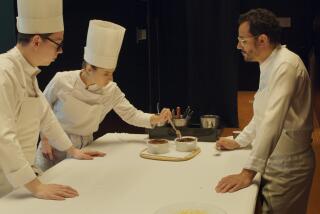TV Pick: ‘At Berkeley’
- Share via
“At Berkeley” (PBS, Monday). Shown as part of the series “The Independent Lens,” the latest work from 84-year-old cinéma vérité master (and public television stalwart) Frederick Wiseman was shot at UC Berkeley in 2010; it was a time of crisis in that the university was dealing with shrinking funding, higher fees, lower salaries and layoffs. But crisis is also a kind of tradition at the school -- as in life, after all -- and the overriding sense here is not of something about to crack, but of a place that has lasted and will continue, for a while, to last.
Wiseman’s 38th such institutional documentary, it runs a bounteous four hours, which some will see as a gift and others as a challenge, and still others as a gift and a challenge, and will put many off entirely; but to my mind every Wiseman film (and this is not the longest -- “Belfast, Maine” tops it by four minutes) is just as long as it needs to be. In a time when documentary film has absorbed (too) much from reality television, and a shot lasts forever if it lasts four seconds, Wiseman stays loyal to the long take.
WINTER TV PREVIEW: Full coverage of the season’s shows
Scenes don’t just make a single informational point and retire; the information is the scene, in all its (yes, sometimes wearing) complexity, the flow of discussion, the interplay of the players, the action that leads to a result and not merely the result -- what people have to say and how they say it, and how they occupy the world together. If your mind wanders a bit during the course of this, I would say that this is part of what it means to be a fly on a wall.
There is a musical flow to Wiseman’s work, alternating slow and fast, soft and loud, the close-up and the faraway; he is not here to argue a point, or to construct a mock drama that builds to any sort of climax. (The stories he tells, if you want to call them stories, begin before the beginning and end after the ending -- “in medias res” might be his motto.) Typically, the longer scenes are spelled, and given context, but place-defining montages change the speed without disturbing the overall sense of repose. John Davey, who has worked for Wiseman since the 1980s, does gorgeous work that doesn’t call attention to itself. Where the longer scenes let your eyes move around in the frame, maybe focusing for a while on a speaker’s hands, or the wandering attention of a person behind them, or the light outside the window, these more rapidly edited interludes point you toward details and choreograph activity, capturing a sense of space and air, but also, in the way that figures enter, leave or move through the picture, a kind of human comedy.
BEST TV OF 2013 Lloyd | McNamara
Wiseman has made films about the military, police, a religious order, horse racing, schools for the blind and the deaf, the Idaho state legislature, the Comedie Francaise, the Crazy Horse and the Panama Canal, among other things. The debates about public education and public space, and also what happens privately (if on camera) determines the use of that space. There are, as is his custom, and that of his generation of filmmakers, no identifying or explanatory titles, no talking heads; you only know what you see, and what you see is something akin perhaps to riding around in Wiseman’s head without actually being privy to his thoughts, while he moves through classrooms and conference rooms and common spaces. We get a taste of science and poetry, history and economics; we drop in on a veterans group, hear some music, see some theater, a little lacrosse. Wiseman was around to capture the student protests, including the occupation of a library, but that too is mostly talking; characters now in power, who once were protesters, remember old days, adding an element of passing time that also intimates time to come.
Though there is necessarily a vision here, reflecting decisions about what to shoot and how to shoot it and what to include and what to cut and in what order -- it is not mere randomness that Wiseman begins with a woman discussing the university’s history and ends with a professor looking into the far future of space travel -- he does not push you to any sort of judgment. You are left to mull it over for yourself.
More to Read
The complete guide to home viewing
Get Screen Gab for everything about the TV shows and streaming movies everyone’s talking about.
You may occasionally receive promotional content from the Los Angeles Times.







